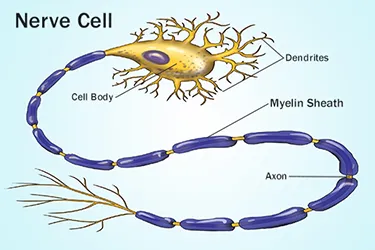What Is a Myelin Sheath?
Myelin sheaths are sleeves of fatty tissue that protect your nerve cells. These cells are part of your central nervous system, which carries messages back and forth between your brain and the rest of your body.
Myelin sheath function
The myelin sheath serves three main purposes:
- It acts as insulation, similar to the plastic coating around electrical wires, keeping your nerve cells safe.
- It helps electrical signals move fast and smoothly from one nerve cell to another.
- It preserves the strength of the electrical message as it travels
If you have a disease that damages your myelin sheath, your nerves won't be able to send and receive messages as they should. The most common disease affecting your myelin sheath is multiple sclerosis (MS), which causes your immune system to attack your central nervous system.
Myelin Sheath Disorders
There are other diseases that affect the central nervous system and peripheral nervous system by attacking the myelin, including:
Central nervous system diseases
Acute disseminated encephalomyelitis. This rare, intense immune reaction affects the central nervous system.
Schilder’s sclerosis. Also known as diffuse myelinoclastic sclerosis, it's a rare disease in children that damages and destroys parts of the nervous system.
Transverse myelitis. This autoimmune disorder causes inflammation in the spinal cord.
Neuromyelitis optica. This disease causes an immune attack on the optic nerves and spinal cord.
Optic neuritis. This is inflammation of the eye nerves.
Tumefactive demyelination. This is a single lesion larger than 2 centimeters that's destroying the myelin sheath (demyelination).
Peripheral nervous system diseases
Guillain-Barre syndrome. An infection or vaccination often triggers this immune disease.
Chronic inflammatory demyelinating polyradiculoneuropathy. This is an autoimmune disease attacking myelin.
Paraproteinemic demyelinating neuropathy. This condition is a neuropathy linked with certain antibodies associated with cancer.
Charcot-Marie-Tooth disease type 1 and type X. These are neuropathies passed down through your family.
Copper deficiency. A lack of copper can affect myelin protection.
Other conditions
Other conditions that can damage myelin in adults include:
- Stroke
- Infections, immune disorders, and metabolic disorders
- Exposure to toxins
- A lack of vitamin B12
- Certain drugs like ethambutol
- Drinking too much alcohol
There are also rare diseases passed down through your family where the myelin sheath doesn't form properly, such as Tay-Sachs disease, Gaucher disease, Hurler syndrome, and Niemann-Pick disease.
Myelin and Your Nerves

When the myelin sheath is healthy, nerve signals are sent and received quickly. But when something damages your myelin sheath, it can slow or stop these electrical signals.
Myelin sheath damage
Symptoms of myelin sheath damage depend on which disease you have. They can include:
- Changes in vision, such as blurry vision, problems with color vision, eye pain, or double vision
- Tingling or numbness in different parts of the body
- A feeling of tightness or squeezing around the chest or abdomen, sometimes referred to as an "MS hug"
- Feeling extremely tired even after rest
- Issues with bladder or bowel control, like trouble peeing or a sudden urge to go
- Sensations like electrical tingling or shocks down the back, arms, or legs when bending the neck forward
- Trouble walking or problems with coordination
- Muscle weakness or stiffness
These symptoms can affect one part of your body or multiple areas at the same time. They may also feel more intense at times and then get better.
Myelin Sheath and Multiple Sclerosis
If you have MS, your body's immune system treats myelin as a threat. It attacks both the myelin and the cells that make it. When that happens, the nerves inside the sheath can be damaged. This leaves scars on your nerves called sclerosis and makes it harder for them to carry the messages that tell your body to move.
MS can weaken muscles, damage coordination, and, in the worst cases, paralyze people. It affects about 1 million Americans and usually appears between ages 20 and 50. What causes it is not clear, and there is no cure.
Myelin Research
Much of the MS research focuses on boosting your body's ability to repair damaged myelin. Scientists are looking into:
- Ways to prevent the chemical reactions that lead to myelin damage
- Drugs or experimental treatments that might prevent or fix multiple sclerosis
- Which antibodies -- the disease-fighting proteins your immune system makes -- attack myelin
- If stem cells -- which can grow into different types of tissues -- can be used to reverse the damage caused by MS
Preventing myelin sheath damage
Researchers are looking at different ways to stop the chemical reactions that harm myelin, including natural substances that help build myelin and others that may disrupt it. Some of this work is still in its early stages, and it’s unclear if the findings apply to people.
Multiple sclerosis treatments
Recent early-stage studies have looked into various ways to stop, reverse, or treat MS, including:
- Using small pieces of protein (called peptide-based molecules), which have shown promise in reversing MS or stopping the disease from getting worse
- Small-molecule drugs that target a type of white blood cell called B cells, which could help manage MS symptoms
- Therapies that target remyelination or rebuilding myelin
Antibodies attacking myelin
Early research has discovered different antibodies that attack myelin. For example, researchers have found that antibodies against a specific protein called proteolipid protein 1 (PLP1) could be more common in the fluid around the brain and spine of people with MS. These studies highlight the need for more research to understand how antibodies play a role in disease.
Stem cells to reverse multiple sclerosis damage
Stem cell-based therapies, especially those using mesenchymal stem cells (MSCs), show promise in reversing MS-related damage. Research suggests that these therapies can ease the inflammation that happens with MS, improve neurological problems, and help heal the central nervous system.
Takeaways
Myelin sheaths are protective coverings around nerve cells in your central nervous system. They're crucial for efficient nerve signaling between your brain and body. In MS and other diseases, the immune system attacks these myelin sheaths, disrupting nerve communication. Research efforts aim to understand how to repair damaged myelin, prevent its destruction, and treat health conditions that damage myelin.

